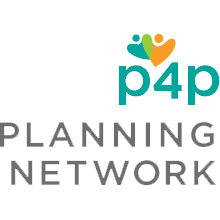
TRANSITIONING TO HIGH SCHOOL
TRANSITIONING TO HIGH SCHOOL
Starting high school is a big step on a young person’s journey to adulthood. It’s an exciting time of personal growth, new discoveries, and opportunity.
It is also a big change for all young people and their families. It is a time that can make people feel anxious and excited. Sometimes people feel nervous too. You might be feeling like time has flown by. This is a new chapter in your teen’s life and one that you as a parent can play an important role in.

For school boards across Ontario, supporting all students to move from elementary school to high school is a priority. Many boards create innovative transition plans to support students' success. If your child also happens to have a disability, there are additional policies in place to support this phase of their life. You can read about what mandated supports are available to your family in the Ministry of Education's resource below.
Resource: Ministry’s Policy and Resource Guide for Special Education
Discovering Your Options
As your child is approaching a transition into high school, you will also want to learn about what transition supports are provided by your child's school board. Supports and planning options vary from board to board and even school to school. Arrange to speak with your child's resource teacher or principal to learn about opportunities to visit their new high school and meet with teachers.
Learn the difference between attaining a high school diploma and a certificate. Aim high and focus on learning pathways that enable your child to earn credits. Even if it takes longer or more than one attempt, earning credits is a stepping stone for future opportunities. If you're unsure, get feedback from other families who have been through the process and who had successful outcomes. Be proactive and start researching your options early. You can start as early as grade 6 and 7.
Proactive Transition Planning
While each school board functions differently, many provide Individualized Transition Plans in Grade 8. Parents should be prepared to start conversations early when preparing for transitions. We can’t emphasize enough that the transition planning process is a chance for everyone (student, family, teachers, and administrators) to be clear on what your vision is for your child’s future. Putting in the effort to develop a vision with your son or daughter and family, before this transition, is critical to their long-term success.
We know that it takes a team of dedicated people to rally around our students and ensure their success. Building on Successes is a tool that enables parents and educators to capture important information about a child currently in a transition phase. With a vision in mind, and with a focus on strengths, this tool can help transfer knowledge about successful strategies that have improved your child's school experience and learning outcomes. The goal is to make sure everyone feels supported and informed about what they can do to support a student to be successful.This document is complementary to Ministry mandated transition documents and individual education plans. Click here for tips on using this tool.
The old saying, “If you don’t know where you’re going, any road will do,” applies here. A successful transition plan involves having a strong vision for your child’s future. It also involves having clear expectations for your child’s education. Parents need to be prepared to advocate for these things with their school team.
Would you like your child to work towards employment or maybe attending university or college? Would you like them to achieve specific learning goals or to focus on growing their communication skills? Would you like them to be involved in mainstream school activities and to be socially active in the school community?
Having a vision is all about thinking about the “big picture”.
What are your end goals?
Now is a great time to review, renew or rewrite a vision with your teen. Now is also a time when your teen’s dreams and goals start to become their own. We encourage all families to have high expectations for what is possible for your son or daughter.
Ingrid Muschta is a mother, of a son with a disability, with a very clear vision and clear action steps.
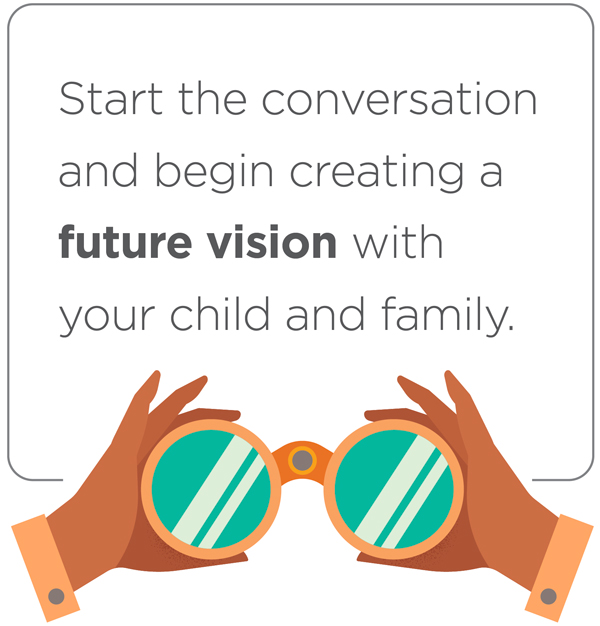

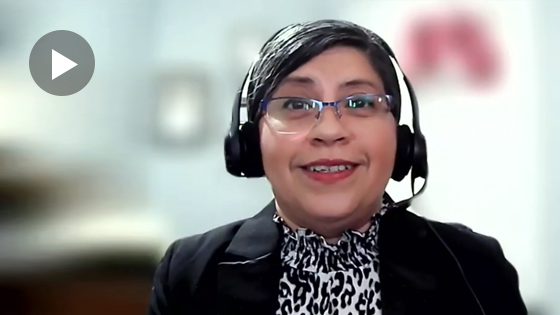
Your vision and expectations will determine the types of placements, course selection, access to opportunities like CO-OP, the types of supports and the school activities that your child will have access to. But more importantly, it will influence the ways in which others think about possibilities for your child.
If you’re new to the idea of creating a future vision, you might want to check out Taking Charge of Your Life. It’s a practical tool that you can use to start the conversation and begin creating a future vision with your child and family.
SUPPORTING YOUR VISION
Hopefully you now have a sense of what your child’s vision is for their life. Next, what steps can you take that will move them closer to their dream? Sharing your vision with educators can help them identify the learning path and opportunities that will help your son or daughter move forward. But you can also support this vision with choices you make at home and after school and on weekends.
Trying New Experiences
Getting involved and trying a variety of new experiences can lead to some surprising new opportunities.
Chef Anthony is a young man who volunteered early in high school. That experience ignited a passion in him for cooking and baking. Eventually, it also led Anthony to attend George Brown College where he studied to become a chef. This one volunteer opportunity helped launch a passion in Anthony that he has now turned in to a successful career.
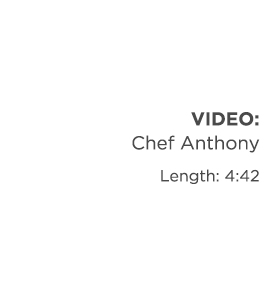
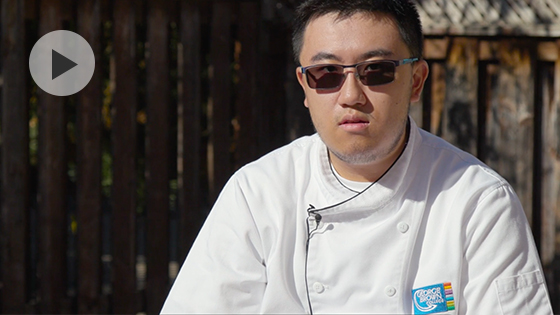
Encourage your child to be curious. Look for learning opportunities that build on your child’s interests. Use their hopes and dreams, of who they want to be and what they want to do, to guide you.
Some ideas you might want to consider:
- Are there clubs, community programs, community spaces or leisure activities that they might enjoy being a part of? This in turn can create opportunities that also lead to friendships!
- Volunteering is a way for your child to meet new people who share their interests and passions. Meeting people who have expertise and knowledge can also unlock more opportunities for your child and grow their skills, social circle or network.
- Train your support team and share your teen’s dreams with them. Explain the dream and the importance of the roles your child can explore to pursue that dream. Keep the focus on the skills and experiences you want them to have when they leave high school and enter adulthood. These steps can help you create roles that will turn a dream into a reality.
For example: Let’s say you daughter’s dream is to be a Vet Technologist and work with animals. There are many concrete actions that you can take to focus on this dream.
Community Living Ontario's Student Links Program
A terrific opportunity for learning new skills and exploring an interest is by spending time with mentors who share those passions and who can teach you some new skills. Community Living Ontario (CLO) supports youth (14-21), who are enrolled at a secondary school in Ontario, to develop their interests by connecting them to mentors in their community. Check out the CLO Student Links webpage to learn more!
Students across Ontario are exploring their interests through mentorships right now! Some examples include:
- Exploring a love for vintage cars with a specialized mechanic
- Investigating 3-D printing with a technology specialist
- Expanding on a passion for art with a social media blogger who has a strong arts-based following
- Learning about agricultural machinery by volunteering on a farm
Stories To Inspire You
Listen to learn how a mentorship helped Rebecca to explore new ways of sharing her artwork HERE
Public speaking was a passion for Sam. Listen to discover how his mentor Dan helped him grow his skillset as a storyteller HERE


In high school, students are expected to grow their independence and learn to exercise more choice. This is an important time to encourage your teen to find their voice. Encourage them to ask to participate in opportunities available to the rest of the student body. Help them learn how to communicate to teachers which school activities and clubs they want to join.
In addition, are there youth-based opportunities in your community that they would be interested in? For example, is there a youth advisory group or an environmental organization that your teen could join and volunteer with? Being with their peers in these types of social settings builds on their confidence and shapes meaningful social roles.
Think about how you can grow their independence at home too.
Encourage your child to help more and take on some responsibility at home. Start from an early age. This will increase the likelihood that they will have the skills and independence needed as teens to get a part-time job or a volunteer placement.
The “First” Job
Do you remember your first job?
Youth who have some work experience as teens have a greater chance of securing employment after high school as adults. Summer jobs are a great place to make some money and gain work experience. A summer job is not likely to become your teen’s dream job. However, it is a valuable learning experience for them. They will learn what they like and don’t like about different types of work and different working environments.
Where to start:
Advocate for your child to be enrolled in a Careers class (CHV2O in Ontario) in grade ten. In this class, all students in Ontario learn about how to write a resume and practice job interview skills.
Another place you can go is an employment agency in your community. It doesn’t have to be disability related. Employment agencies offer resume writing courses and 1-1 support.
Get creative and have fun building a resume together!
A Few More Ideas
Another strategy some families use is to pre-record an introductory “This is me” video of their teen. Your son or daughter can play this video on their phone before the interview begins.
Some organizations offer job coaching. A good job coach is someone who has respected relationships with employers in your community. They will also make themselves ‘invisible’ to others when supporting your teen. They will make every effort to ensure that they don’t stand out to others. Their support should not distract your teen from completing their job tasks.
Right now, a lot of people are talking about how to better support people of all abilities to gain meaningful work in their community.
Accessibility for Ontarians Disability Act (AODA)

FOCUS ON FRIENDSHIPS
Friendships are a very important part of a teenager’s life. The best of friends are made between young people who have shared interests. Teaching your child how to take an interest in what other people are interested in is key to building reciprocal relationships.
- Where are your child’s peers hanging out?
- What are they into? (gaming, music, movies, social media, technology, sports, recreational activities).
- Is there a teen friendly activity that can happen in your home or backyard? (i.e. gaming nights, movie nights, bonfire in the backyard, baking, spa days, crafting).
Advocating for your child to be included in school community activities alongside their peers who do not have a disability, and being in classes with those same peers, will help your child get to know and be known by others. Research shows that students are more likely to be recognized as a valued member of the school community if they are part of regular school activities and learn alongside their peers who do not have a disability (source).
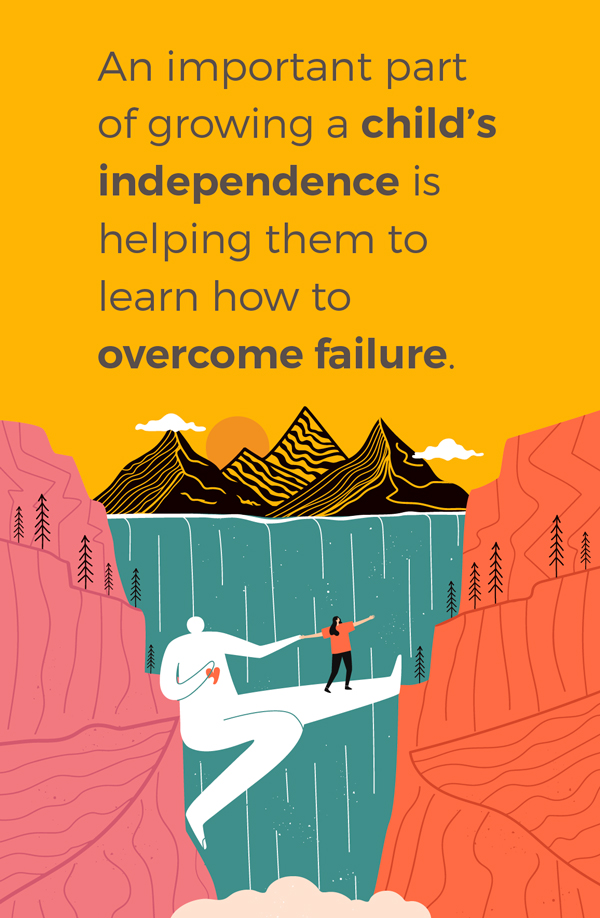
Teaching your child to prioritize self-care is important to their health and wellness. Especially as sexuality and body image become a priority for developing teenagers. Smelling good and looking good are positive things that will help them to feel confident.
An important part of growing a child’s independence is helping them to learn how to overcome failure. Giving your teen more choices, gives them the opportunity to calculate risks and learn from their mistakes.
The attitudes and expectations of parents determine the opportunities that are given to their children. A person’s high school experience will greatly influence what opportunities will be available to them as they enter their adult lives. It is important to have a clear vision and a strong support system at school, and at home.
Raising The Bar
As parents, we know that negative attitudes of disability still exist in our society. We work hard to overcome them every day. However, the possibilities for our loved ones are endless if we don’t allow negative perceptions to get in the way. Our children have proven this repeatedly.
Disability is not the obstacle. We invite you to listen to Doug Cartan, a long-time family friend of a young woman named Rebecca. In this video entitled Challenging Perceptions, Doug talks about what he’s learned about the power of perceptions from his friendship with Rebecca.


